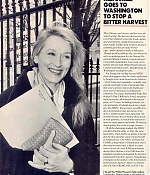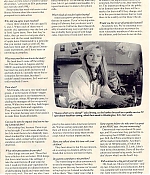|
Simply Streep is your premiere source on Meryl Streep's work on film, television and in the theatre - a career that has won her the praise to be one of the world's greatest working actresses. Created in 1999, we have built an extensive collection to discover Miss Streep's body of work through articles, photos and videos. Enjoy your stay.
|
Celebrating
25 years
of SimplyStreep
|
|
Ms. Streep Goes to Washington to Stop a Bitter Harvest
People Magazine ·
March 20, 1989
· Written by Bonnie Johnson
|
Meryl Streep was furious, and for once she wasn’t acting. She had just discovered that two of her children’s favorite foods, apples and strawberries, might be hazardous to their health. Unlike most mothers, Streep’s celebrity gave her an outlet for her rage—and a chance to make a difference. Though usually publicity-shy, she offered to serve as spokesperson for the Natural Resources Defense Council, a nonprofit environmental organization. Last week, on its behalf, she met with White House General Counsel and ethics czar C. Boy den Gray in Washington to plead her case.
For Streep, the red flag was an NRDC study that suggests that the foods traditionally thought to be most beneficial to children—-fresh fruits and vegetables—actually may contain such high levels of pesticides that they pose a serious risk to the health and even lives of America’s 22 million preschoolers. The study, Intolerable Risk: Pesticides in Our Children’s Food, measures eight pesticides, all believed to be carcinogenic, in 27 crops, including potatoes, carrots and apples. Pesticide levels are so high, says the NRDC, that as many as 6,200 of today’s preschoolers may get cancer from them. Children under 6 are especially vulnerable because they consume these foods in such quantity: A preschooler eats seven times as many apples and drinks 18 times as much apple juice as the average woman.
Of all the chemicals studied, the NRDC considers Daminozide, or Alar, the most hazardous. Used chiefly on apples, it permeates the skin and thus cannot be peeled off or washed away. The NRDC predicts that UDMH, a byproduct of Daminozide that is also used in rocket fuel, is likely to cause cancer in one of every 4,200 preschoolers during their lifetime, a level 240 times the standard considered acceptable by the Environmental Protection Agency. Nonetheless, it remains on the market. (The Environmental Protection Agency’s figure is a lifetime risk of 4.5 per 100,000. Still, on Feb. 1 the agency announced that it plans to “within 90 days issue our first notice of intent to cancel this product,” a process an EPA spokesman says may take until 1990.)
Streep talked last week with senior writer Bonnie Johnson about the concerns that prompted her to take action.
Why did you agree to get involved?
I have three children who are aged 9, 5, and 2. When each of them was 4 months old, applesauce was the first solid food I gave them. Now that they’re older, they go over to everyone else’s house and do the usual mainlining of apple juice. Daminozide is a pesticide that you cannot wash or peel off. My kids have been part of the great Daminozide experiment, and I have been an unwitting accomplice.
What was your first reaction to the study?
My head hasn’t come off the ceiling yet. This was back in August, and the NRDC people kept telling me that what I had read was just a draft and not to tell anybody about it. I actually sat on the information for two days, but then I couldn’t stand it anymore. So I went and told everybody I knew.
Then what?
My friends, who are a very motivated group—I’m the laziest of them—organized a symposium in our hometown in Connecticut. About 500 people came, including the managers of the two grocery stores. Within two weeks they both began selling organic fruits and vegetables. They even have a little price war going now. It’s great, because one of our goals is to make these foods affordable.
Can you he sure the organic food you’re buying is pesticide free?
I’m trusting that, because I have to go to bed at night. I’m not insane about this, but I do want there to be a federally mandated standard for what organic means, a beautiful, strict, conservative, scientific standard, and I want it to be vigilantly observed.
What other precautions do you take?
I buy things you can peel. Those that have a thicker skin are better. With things that have outer leaves, like cabbage, I take the outer leaves off and wash the rest. I wash my fruits and vegetables for two to three minutes in a diluted solution of dishwashing liquid and water and rinse them really well. This isn’t my idea. I saw a USDA agent on Donahue telling people to do this. Do you know how long two to three minutes is? It’s so boring, and every time I do it I get madder and madder. It’s a good motivator to make a few phone calls.
Which foods do you feel safest buying?
American-grown produce and those that are in season. If you’re buying something in February that you know won’t grow even in California, then it has probably traveled a long way to get here and has probably been sprayed with fungicides. Importers of food don’t have to play by the same rules American farmers do. We ban certain pesticides here but then sell them in Central and South America where they spray them on the crops which we then import and eat.
Have you talked about this issue with your children?
They hear about it, but I’m not interested in scaring my children off the very foods that we know are best for them.
Do parents contribute to the problem?
The worst thing we do as consumers is to send a message to farmers that they have to grow this way because we’re used to buying by eye. Instead we should be telling them, “Hey, I don’t care what it looks like as long as it’s pure and nutritious.” The bananas I buy now are a little smaller, the apples look a little more scratched, but believe me, they taste better. The important thing is for the public to let farmers know that there will be a market for their stuff if they change, and to let the government know that we want there to be a safety net for those who do.
Would you like to see all pesticides banned?
Absolutely not. We’re interested in readjusting the tolerances to protect the most vulnerable members of this society, the children, and the laws do not do that.
Some experts believe the risks aren’t as great as the NRDC says. Are you overreacting?
Daminozide was introduced 26 years ago, and 10 years later they got the first results saying that UDMH was a carcinogen. Still, the EPA is unwilling to take it off the market immediately. And that’s just one of 300 pesticides, of which the-NRDC has studied only 23. Look, I don’t want to be a biochemist. I have all the education any human being needs, but still I don’t know what’s on the food I buy.
Will activism be a big part of your life now?
Oh, God, no. This is my first time—and my last. It has been a real education, but it was complete self-interest that motivated me. I just want to be able to go and shop with a clear conscience.











